I found a lump at age 32, just four months after a clear clinical breast exam. No family history. No genetic markers. I noticed the golf-ball-sized mass one day while putting on my bra.
It turned out to be stage 3C, with spread to 14 lymph nodes, as advanced as it gets without being terminal. I went through a year of aggressive treatments: bilateral mastectomy, chemo, radiation, reconstruction, and hormone therapy.
My 3-year-old’s first memory was of me flushing a clump of hair down the toilet a few weeks after chemo started. Later that day my 7-year-old and 5-year-old helped my husband shave my head. More than anything, I desperately longed for the chance to raise those three kids.
I eventually had the courage to ask my oncologist about my survival chances. She asked: Are you sure you want to know? Even with all that treatment, I had a 50 percent chance of recurrence within 5 years.
I had followed all of the medical recommendations about breast screening. “Early detection saves lives,” I had been promised. I did detect as early as possible; why were my stats so abysmal?
I was surprised to learn that my case was more typical than rare for an early-onset survivor. Eighty percent of young survivors find the cancer themselves. Only a small minority have a family history of breast cancer. Screening mammograms are currently recommended only for women age 40 and up. Mammograms are often ineffective on dense young breasts. Both dense breast tissue and tumors show up as white on a mammogram; radiologists compare it to finding a “polar bear in a snow storm.”
Well, I thought, then breast cancer must be extraordinarily rare before midlife. Nope. Breast cancer affects about 1 in 200 women in their 30s, not all that uncommon. It is the second leading cause of death of women in that age group. The incidence of early-onset cancers is rising. Even doctors wrongly assume that women in their 30s are too young for breast cancer. Molly Kochan, the real-life woman behind the Hulu show Dying for Sex, was dismissed by her doctor when she was 32, the same age as I was. In part because of that lack of timely treatment, she later died from metastatic breast cancer.
Well, don’t young women at least have cancers that are less aggressive? Wrong again; young women tend to have more aggressive cancers. This seems to be both because the lack of screening leads to later detection and more advanced staging, and that early-onset cancers seem to be biologically different than cancers in older women. These stats are especially maddening for young Black women, who die of breast cancer more than twice as often as white women with similar diagnoses.
I am so pleased about the strides we have made against breast cancer in the over fifty years since we declared war on cancer. But why are young women not getting the full benefit of these gains? Why don’t young women have an effective method of screening, so we can have the power of early detection on our side?
As I got my infusions in the chemo room, I would gaze at the older folks there. Envy rose up in me; they got their 30s and 40s and 50s. If they had kids, they got the chance to raise them.
If it had been possible for me to purchase the chance to raise my kids by cashing in the remainder of my life afterwards, I would have made that deal in a heartbeat. Present me would happily make good on that bargain. Life years matter. They matter to the young person with cancer. They matter to the children and spouses left behind.
As a society we invest in the young. This is why we have schools, child psychologists, and early intervention programs. Why don’t we do this with cancer treatment, prioritizing research for screenings and treatments for young people?
Next month I celebrate 20 years of life after my diagnosis. I am healthy. I got my wish; I raised my children to adulthood. I feel so lucky and grateful. But I don’t forget that each time I logged into my young survivor support forums, I saw friends who had entered the stage 4 club, or died. They cannot advocate today. I speak for them and their loved ones.
It’s been 45 years since Susan G. Komen died of breast cancer at age 36. Early-onset breast cancer is nothing new. Even after all these years, young women still don’t have an effective recommended method of breast cancer screening. This is inexcusable. We need funding for better screening tools for young women, better research into the unique biology of early-onset cancers, and public awareness campaigns that reflect the reality that breast cancer isn’t just an older woman’s disease.
Sara Rands is a psychotherapist and patient advocate.




















![AI censorship threatens the lifeline of caregiver support [PODCAST]](https://kevinmd.com/wp-content/uploads/Design-2-190x100.jpg)

